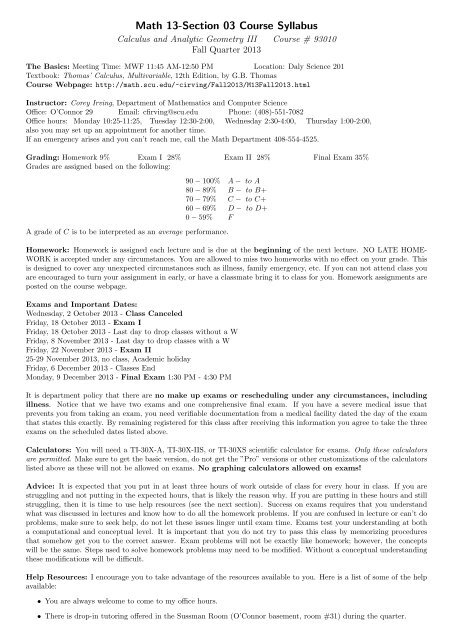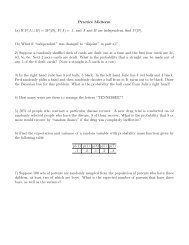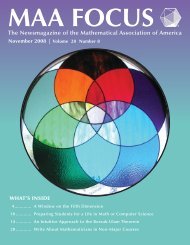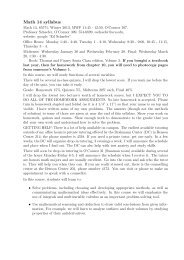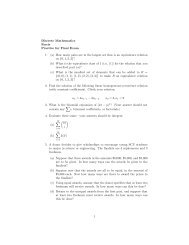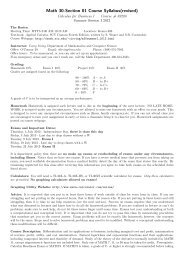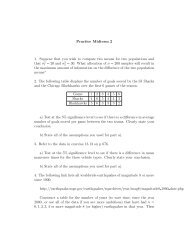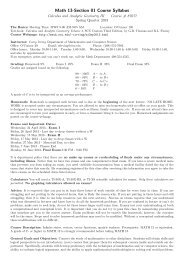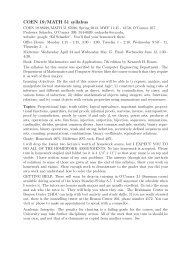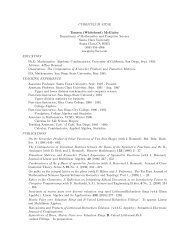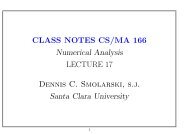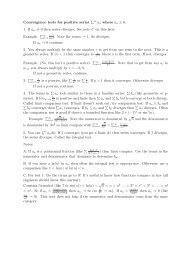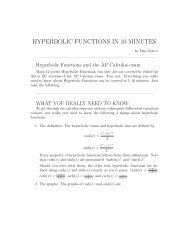Math 13-Section 03 Course Syllabus
Math 13-Section 03 Course Syllabus
Math 13-Section 03 Course Syllabus
You also want an ePaper? Increase the reach of your titles
YUMPU automatically turns print PDFs into web optimized ePapers that Google loves.
<strong>Math</strong> <strong>13</strong>-<strong>Section</strong> <strong>03</strong> <strong>Course</strong> <strong>Syllabus</strong><br />
Calculus and Analytic Geometry III <strong>Course</strong> # 93010<br />
Fall Quarter 20<strong>13</strong><br />
The Basics: Meeting Time: MWF 11:45 AM-12:50 PM Location: Daly Science 201<br />
Textbook: Thomas’ Calculus, Multivariable, 12th Edition, by G.B. Thomas<br />
<strong>Course</strong> Webpage: http://math.scu.edu/~cirving/Fall20<strong>13</strong>/M<strong>13</strong>Fall20<strong>13</strong>.html<br />
Instructor: Corey Irving, Department of <strong>Math</strong>ematics and Computer Science<br />
Office: O’Connor 29 Email: cfirving@scu.edu Phone: (408)-551-7082<br />
Office hours: Monday 10:25-11:25, Tuesday 12:30-2:00, Wednesday 2:30-4:00, Thursday 1:00-2:00,<br />
also you may set up an appointment for another time.<br />
If an emergency arises and you can’t reach me, call the <strong>Math</strong> Department 408-554-4525.<br />
Grading: Homework 9% Exam I 28% Exam II 28% Final Exam 35%<br />
Grades are assigned based on the following:<br />
90 − 100% A − to A<br />
80 − 89% B − to B+<br />
70 − 79% C − to C+<br />
60 − 69% D − to D+<br />
0 − 59% F<br />
A grade of C is to be interpreted as an average performance.<br />
Homework: Homework is assigned each lecture and is due at the beginning of the next lecture. NO LATE HOME-<br />
WORK is accepted under any circumstances. You are allowed to miss two homeworks with no effect on your grade. This<br />
is designed to cover any unexpected circumstances such as illness, family emergency, etc. If you can not attend class you<br />
are encouraged to turn your assignment in early, or have a classmate bring it to class for you. Homework assignments are<br />
posted on the course webpage.<br />
Exams and Important Dates:<br />
Wednesday, 2 October 20<strong>13</strong> - Class Canceled<br />
Friday, 18 October 20<strong>13</strong> - Exam I<br />
Friday, 18 October 20<strong>13</strong> - Last day to drop classes without a W<br />
Friday, 8 November 20<strong>13</strong> - Last day to drop classes with a W<br />
Friday, 22 November 20<strong>13</strong> - Exam II<br />
25-29 November 20<strong>13</strong>, no class, Academic holiday<br />
Friday, 6 December 20<strong>13</strong> - Classes End<br />
Monday, 9 December 20<strong>13</strong> - Final Exam 1:30 PM - 4:30 PM<br />
It is department policy that there are no make up exams or rescheduling under any circumstances, including<br />
illness. Notice that we have two exams and one comprehensive final exam. If you have a severe medical issue that<br />
prevents you from taking an exam, you need verifiable documentation from a medical facility dated the day of the exam<br />
that states this exactly. By remaining registered for this class after receiving this information you agree to take the three<br />
exams on the scheduled dates listed above.<br />
Calculators: You will need a TI-30X-A, TI-30X-IIS, or TI-30XS scientific calculator for exams. Only these calculators<br />
are permitted. Make sure to get the basic version, do not get the ”Pro” versions or other customizations of the calculators<br />
listed above as these will not be allowed on exams. No graphing calculators allowed on exams!<br />
Advice: It is expected that you put in at least three hours of work outside of class for every hour in class. If you are<br />
struggling and not putting in the expected hours, that is likely the reason why. If you are putting in these hours and still<br />
struggling, then it is time to use help resources (see the next section). Success on exams requires that you understand<br />
what was discussed in lectures and know how to do all the homework problems. If you are confused in lecture or can’t do<br />
problems, make sure to seek help, do not let these issues linger until exam time. Exams test your understanding at both<br />
a computational and conceptual level. It is important that you do not try to pass this class by memorizing procedures<br />
that somehow get you to the correct answer. Exam problems will not be exactly like homework; however, the concepts<br />
will be the same. Steps used to solve homework problems may need to be modified. Without a conceptual understanding<br />
these modifications will be difficult.<br />
Help Resources: I encourage you to take advantage of the resources available to you. Here is a list of some of the help<br />
available:<br />
• You are always welcome to come to my office hours.<br />
• There is drop-in tutoring offered in the Sussman Room (O’Connor basement, room #31) during the quarter.
• The Drahmann Advising and Learning Center, in Benson Room #1, provides tutoring and assistance for students.<br />
Note: The workload for this course is planned knowing that students have the above resources available to them. You<br />
are not expected to figure out everything by yourself. The material in this course is challenging and will be delivered at a<br />
fast pace. The help resources are not designed to just help failing students, they are designed to be used by all students.<br />
Please incorporate the utilization of the above resources into your regular study routine.<br />
<strong>Course</strong> Description: Infinite series, vectors, vector functions, quadric surfaces. Prerequisite: MATH 12 or equivalent.<br />
A grade of C- or higher in MATH 12 is strongly recommended before taking MATH <strong>13</strong>.<br />
General Goals and Objectives: Connect the study of mathematics to other disciplines. Students will obtain skills and<br />
logical perspectives in our introductory (core) courses that prepare them for subsequent courses inside and outside our department.<br />
Specifically, students will develop proficiency with the techniques of mathematics and/or computer science, the<br />
ability to evaluate logical arguments, and the ability to apply mathematical methodologies to solving real world problems.<br />
For students who choose to pursue a degree in <strong>Math</strong>ematics: Appreciate and develop facility with mathematical structures.<br />
Specific Goals and Objectives: In this course,<br />
• emphasis will be placed on using results from previous calculus courses to solve more complex problems.<br />
• students will learn to find infinite power series to approximate functions and also some non-elementary integrals<br />
involving them.<br />
• students will have multiple opportunities to analyze problems from analytical, geometric, and numerical perspectives.<br />
• beyond computational proficiency, students will strive to understand the meaning of our results, as well as encountering<br />
some central theorems of mathematics.<br />
Academic Integrity The penalty for cheating is a failing grade for the course, and the University may take further<br />
disciplinary action. All of the work that you turn in should be your own, and not that of a classmate or copied from<br />
another source. Please see<br />
http://www.scu.edu/studentlife/resources/academicintegrity/index.cfm for further information.<br />
Disability accommodation policy: To request academic accommodations for a disability, students must contact the<br />
Disability Resources Office located in Benson room 216, (408) 554-4111; TTY (408) 554-5445. Students must provide<br />
documentation of a disability to Disability Resources prior to receiving accommodations.


